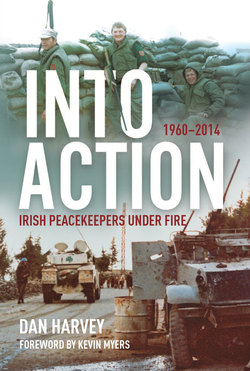Читать книгу Into Action - Dan Harvey - Страница 9
На сайте Литреса книга снята с продажи.
ОглавлениеForeword
No one ever became a soldier in order to be a full-time peacekeeper. A soldier is a warrior, whose primary skill is in the taking of life. To do that efficiently he must obey orders and accept the hierarchy that administers them. These ingredients – the ability to deliver lethal force and a culture of command and submission – enable armies to have other functions that are beyond the scope of most civilian organisations. One of these is peacekeeping, but this is a secondary role and it is one of the misfortunes of the Army of the Republic that this secondary duty is now widely perceived as its primary function.
It most emphatically is not. Those who wear the uniform of the Republic are its true embodiment. They are its soldiers, who accept the lawful commands of the state in its protection and in its service. Whereas An Garda Siochána serves the citizens and enforces the law, the Army defends the Republic – in both the military sense and in the civic sphere – especially in times of emergency. But what underwrites and enables these duties is the ability and willingness of the soldiers of the Republic to take life in its service, and to place their own in harm’s way.
Many men and women like danger. The truth is that large numbers of Irishmen, in the service of many states, have always courted death. This is one reason why Irishmen make great soldiers. But it is the willingness to obey and to use disciplined violence that transforms what might otherwise be a thrill-seeking rabble into an army. And an army is only an army when its members enter a contract that is predicated on killing, and its associated skills.
The many peacekeeping missions that our Army has undertaken for nigh-on sixty years have usually been free of the situations that invoke the killing contract. But that is in large part because armed locals who might otherwise be tempted to use force are usually in no doubt about the consequences if they do. In the absence of violence, a good army will display its martial skills in surrogate but very visible ways: vigilance, discipline, obedience and an easy confidence in the bearing of firearms. These are the vital signals that prevent an armed but passive witness from becoming an active player.
When these messages fail to communicate their underlying purpose, or are ignored, the peacekeeper must revert to his primary duty, the one he or she, by nature, likes best; that of being a soldier whose safety catch is off, looking for a target. When this happens, the enemy will see a quite different soldier from the affable, smiling person who was so obliging at roadblocks and who helped administer the TB jab. This character will, if need be, kill you.
Peacekeepers are not social workers with guns, through whom the local militia would drive with scorn. They can only keep the peace because they can also end it. Dan Harvey has written this fascinating description of when Irish peacekeeping efforts – for whatever reason – no longer kept the peace, and so it was time for fighting. No one joins the Defence Forces without hoping for something like this. Why? Because, at bottom, it’s something that Irish soldiers are good at. Excellent at minding the peace, and just as good at concluding the ambitions and even the heartbeat of those who want to end it.
Kevin Myers, January 2017
